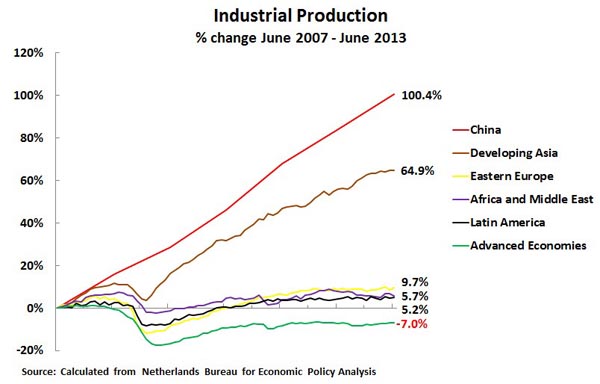China's new industrial revolution
- By John Ross
 0 Comment(s)
0 Comment(s) Print
Print E-mail China.org.cn, August 27, 2013
E-mail China.org.cn, August 27, 2013
As is clear from Figure 3, China accounted for the overwhelming bulk of the increase in the developing economies. Industrial production in Latin America rose by 5 percent, in Africa and the Middle East by 6 percent, and in Eastern Europe by 10 percent. But China's industrial production in this period rose by 100 percent - industrial output in developing Asia as a whole rose by 65 percent, but the majority of this was accounted for by China.

Between 2007 and 2011 China's industrial production rose by US$1,465 billion, in current prices, while U.S. industrial output rose by only $88 billion in current prices and declined slightly in inflation adjusted terms. China's industrial production rose by 17 times as much as the U.S.
Such a rise in China's industrial production has consequences spreading far beyond industry itself. Industry has easily the most rapid increase in productivity of any economic sector – notably compared to services. The decline of industrial production in the EU and Japan, and relative stagnation in the U.S., means that China is cutting the productivity gap between itself and the advanced economies. This is crucial for progress in raising China's relative GDP per capita and living standards.
This rising productivity also explains why China's exports have been able to maintain their competitiveness despite substantial increases in the exchange rate of China's currency the RMB. On Bank for International Settlements data, the RMB's nominal exchange rate rose by 25 percent between July 2007 and July 2013. But China's real effective exchange rate, that is taking into account the combined effect of the nominal exchange rate and inflation, rose by 31 percent. Despite this major currency revaluation China's exports continued to exceed its imports.
China's ability to successfully absorb such high increases in its exchange rate, due to high levels of industrial productivity increases, directly translates into relatively lower prices for imports and improved relative living standards for its population.
The data also settles the dispute between who believed there was a major industrial revival in the U.S., such as the Boston Consulting Group, and Goldman Sachs and other analysts, who have correctly concluded no such major revival has occurred. Those in China, such as Lang Xianping, who wrote that a great U.S. industrial revival was taking place and China's industry was in crisis now look foolish.
It is important not to exaggerate China's advance. China's industrial output is now considerably larger in value terms than the U.S., but the United States retains a substantial technological lead which it will take China a considerable period to catch up with. After a long period of globalization and consolidation by U.S. companies, both processes which are only in their early stages in China, U.S. manufacturing firms are still four times the size of China's in terms of overall global revenue - although between 2007 and 2013 Chinese manufacturing firms overtook Germany to become the third largest manufacturing companies of any country.
The scale of these changes in world industrial production also make clear that in comparison to developments in China gas and oil 'fracking' in the US, which have attracted widespread media attention, is a sideshow – as already noted overall US industrial production has not even recovered to pre-crisis levels.
For the first time for over a century the U.S. has been definitively replaced as the world's largest industrial producer. Such an historic shift can only be described as a revolution in the situation of the world economy.
The author is a columnist with China.org.cn. For more information please visit:
http://www.china.org.cn/opinion/johnross.htm
Opinion articles reflect the views of their authors, not necessarily those of China.org.cn






Go to Forum >>0 Comment(s)